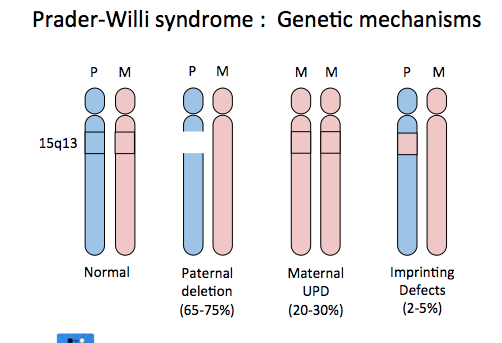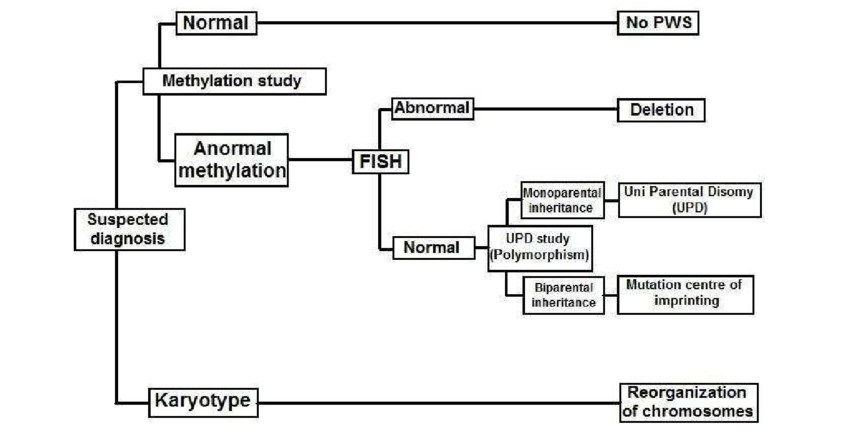If you have just had a meal and feel that you still want more, that is just a desire to eat, rather than real hunger. But what if you feel a never-ending, unsatisfied hunger? That is what they feel and why they suffer.
Prader-Willi syndrome (PWS) is a rare genetic disorder characterized during infancy by diminished muscle tone (hypotonia), feeding difficulties, lethargy, delayed development, and some more. One of the significant features of the affected individuals is, at the beginning of childhood, they develop an insatiable appetite causing chronic overeating that can lead to the onset of life-threatening obesity. Hence there is an increased risk of type 2 diabetes, cardiac insufficiency, respiratory problems, and many more severe complications.
Moreover, they suffer from cognitive impairment including learning and intellectual disabilities. This has led to various behavioral problems such as skin picking, anxiety, and obsessive behavior. They are subjected to hypogonadism that results in underdeveloped sex organs, incomplete puberty ad may cause infertility too.
Genetic basis
Prader-Willi syndrome results from an alteration (deletion or partial deletion) in the molecular composition of a critical region of the proximal long (q) arm of chromosome 15 (q 11-13). In individuals with PWS, the non-functioning PWS region is mostly (70%) located on chromosome 15 inherited from the father. This condition is referred to as genomic imprinting.
Genomic imprinting is a unique epigenetic regulation that is independent of the classical Mendelian inheritance; in which one copy of the gene is active and the other copy of the gene is silenced in a diploid cell in a parental origin-dependent manner. Generally, everyone has two copies of every gene; one received from the father and one received from the mother. In most cases, both genes are “turned on”. However, some genes are preferentially silenced or “turned off” based upon which parent gave the gene to the child. Genomic imprinting is controlled by a process called methylation and other chemical changes in DNA. Proper genomic imprinting is necessary for normal development but defective imprinting is associated with several disorders such as PWS.
When a segment of the paternal chromosome 15 is deleted in each cell, individuals with this chromosomal change are missing certain critical genes in this region because the genes on the paternal copy have been deleted, and the genes on the maternal copy are turned off. In the other 25% of cases, the affected individual has two copies of chromosome 15 inherited from mother (maternal copies) instead of one copy from each parent. This phenomenon is called maternal uniparental disomy.
The lost genes encode for small nucleolar RNAs (snoRNAs) that have a variety of functions, including helping to regulate RNA molecules playing essential roles in producing proteins and in other cellular activities. The loss of a particular set of snoRNA genes, known as the SNORD116 cluster, may cause the signs and symptoms of PWS. However, it is unknown how this could contribute to intellectual disability, behavioral problems, and the physical features of the disorder.
Rarely, Prader-Willi syndrome can also be caused by a chromosomal rearrangement called a translocation, or by a mutation or other defect that abnormally turns off genes on the paternal chromosome 15.
These genetic changes occur as random events during the formation of reproductive cells (eggs and sperms) or in early embryonic development. Affected people typically have no family history of the disorder. Rarely, a genetic change responsible for PWS can be inherited.
Diagnosis and Treatment
A diagnosis of PWS is based upon a detailed patient history with a thorough clinical evaluation and identification of specific symptoms. To confirm a diagnosis of PWS, certain specialized tests are required including DNA methylation tests and fluorescent in-situ hybridization (FISH). Recently, high resolution chromosomal micro-array studies with many DNA probes from throughout the genome are utilized to identify small deletions of the chromosomes that cannot be found with usual chromosome studies and are most useful in identifying the typical chromosome 15 (q11q13) deletion.
The treatment of PWS is directed towards the characteristic symptoms that are detectable in each individual. Early intervention and strict adherence to treatment can improve the overall health of affected individuals and their families. Genetic counseling is done to benefit the affected individuals and their families. Parents are strongly recommended to undergo appropriate parenting techniques for the behavioral and eating issues associated with PWS. They benefit from growth hormone (GH) therapy, which can help to increase height, mobility, and respiratory function, decrease body fat, and may improve development and behavior.
However, currently, there is no permanent cure for PWS. All treatments are only focused on treating the symptoms of the disorder as they arise.
So, they are still hungry for a permanent cure for Prader-Willi syndrome!!!
References:
- https://www.mayoclinic.org/diseases-conditions/prader-willi-syndrome/symptoms-causes/syc-20355997
- https://ghr.nlm.nih.gov/condition/prader-willi-syndrome#synonyms
- https://www.fpwr.org/prader-willi-syndrome-diagnosis-treatments#:~:text=Currently%2C%20there%20is%20no%20cure,treatments%20and%20an%20eventual%20cure.
- https://rarediseases.org/rare-diseases/
Image Courtesy:
- Featured Image: https://bit.ly/2B1hfwX
- Content Image 1: https://bit.ly/2zki5ED
- Content Image 2: https://bit.ly/2AqAmk6
- Content Image 3: https://bit.ly/3cPx7jE




